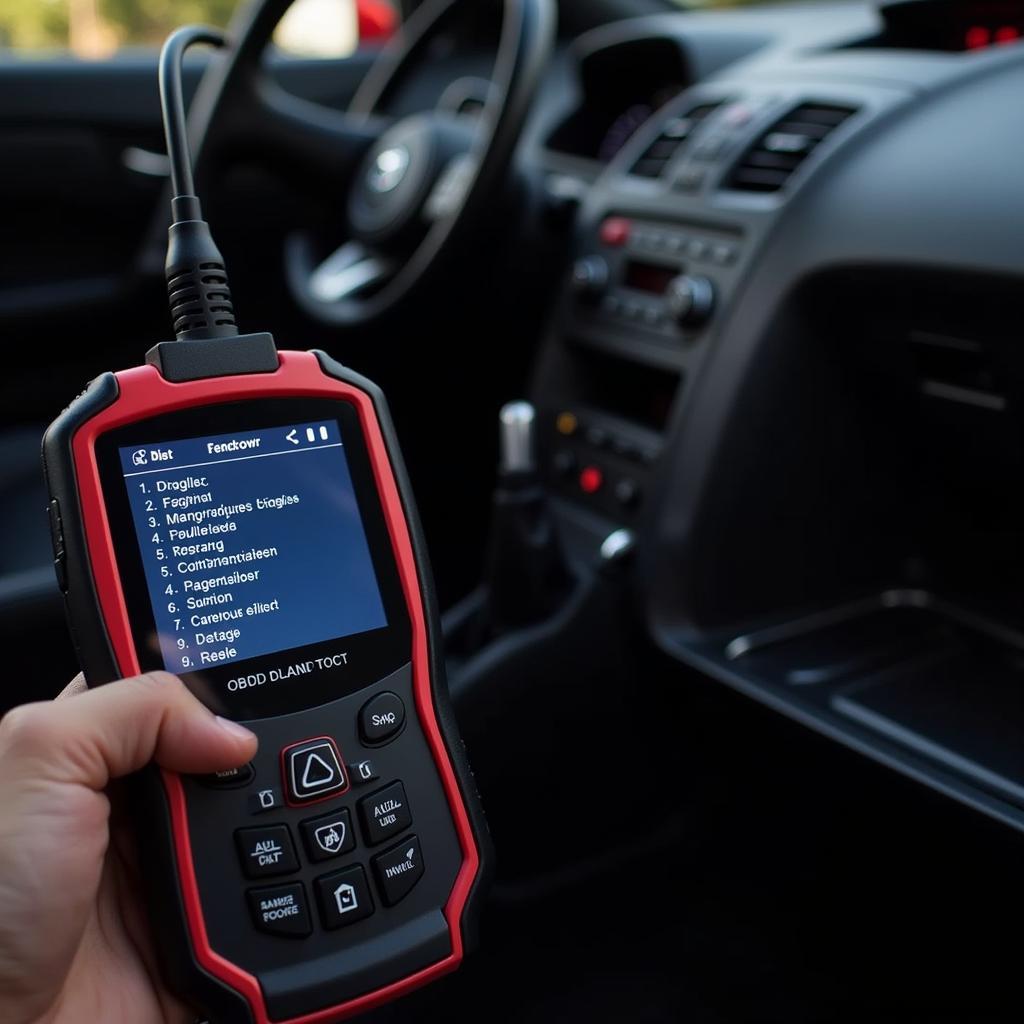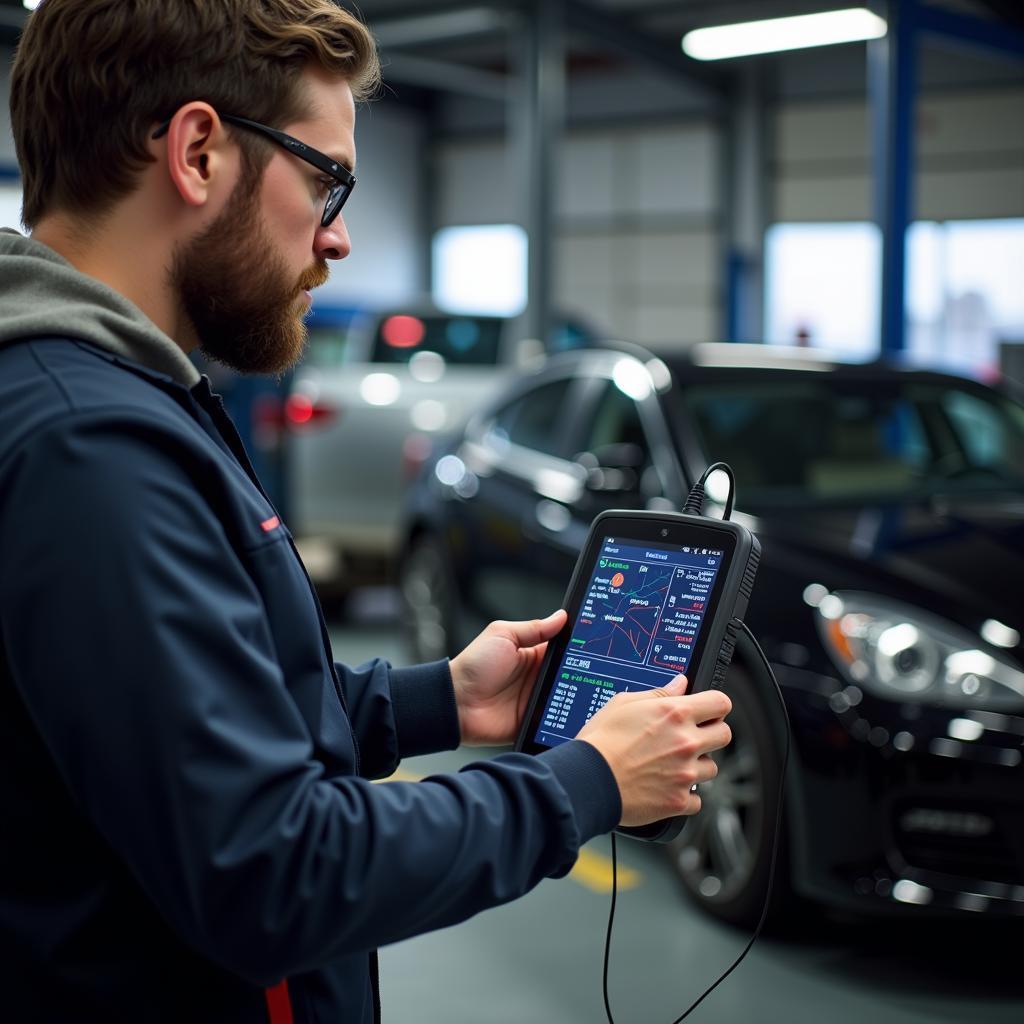Car diagnostics are essentially the vital signs of your car’s health, performed by specialized tools that act as the stethoscope. These tools read and interpret data from your car’s computer system, revealing potential issues and guiding mechanics towards accurate diagnoses and repairs. Gone are the days of relying solely on a mechanic’s intuition – car diagnostics have revolutionized the automotive industry, offering a more precise and efficient approach to vehicle maintenance.
Delving Deeper: How Car Diagnostics Work
At the heart of your car lies the Engine Control Unit (ECU), a sophisticated computer that manages a complex web of systems. Car diagnostic tools, whether basic handheld devices or advanced software used in professional workshops, connect to your car’s ECU, often through the OBD-II port (On-Board Diagnostics).
This connection allows the diagnostic tool to:
- Read Diagnostic Trouble Codes (DTCs): These codes, often alphanumeric, are like distress signals from your car, indicating a specific area of concern within a system.
- Display Live Data Stream: Imagine a live feed of your car’s inner workings. Diagnostic tools can show real-time data from various sensors, providing valuable insights into the engine’s performance, fuel efficiency, emissions, and more.
- Perform Actuator Tests: These tests involve commanding specific components, like solenoids or valves, to activate, helping pinpoint the root cause of a problem.
 Car Diagnostic Tool Connected to a Car’s OBD-II Port
Car Diagnostic Tool Connected to a Car’s OBD-II Port
Types of Car Diagnostic Tools
Car diagnostic tools come in various shapes and sizes, catering to different users and their expertise:
- Basic Code Readers: These affordable and user-friendly devices are perfect for everyday car owners. They can read and sometimes clear basic DTCs, offering a quick glimpse into potential issues.
- OBD-II Scanners: A step up from code readers, OBD-II scanners offer a broader range of functionalities. They can access more data, including live sensor readings and freeze frame data, providing a more comprehensive understanding of your car’s condition.
- Professional Diagnostic Scanners: As their name suggests, these tools are the heavyweights used by mechanics and automotive professionals. They offer advanced features like bi-directional control, allowing mechanics to interact with and test various vehicle systems directly.
 Mechanic Using Professional Diagnostic Scanner in a Garage
Mechanic Using Professional Diagnostic Scanner in a Garage
Why Are Car Diagnostics Important?
In today’s technologically advanced vehicles, car diagnostics play a critical role in:
- Accurate Problem Identification: By pinpointing the source of the issue, diagnostics minimize guesswork, saving time and unnecessary repairs.
- Preventive Maintenance: Regular diagnostics can identify minor issues before they escalate into major problems, preventing costly breakdowns and extending your car’s lifespan.
- Improved Fuel Efficiency: Identifying and addressing issues that impact fuel consumption can lead to significant savings in the long run.
- Reduced Emissions: By ensuring your car’s engine is running optimally, diagnostics contribute to reduced emissions and a cleaner environment.
- Enhanced Safety: Detecting and addressing potential safety hazards early on ensures a safer driving experience.
When Do You Need Car Diagnostics?
While regular checkups are always recommended, certain warning signs indicate the need for a diagnostic scan:
- Illuminated Check Engine Light: This is often the first and most obvious sign that something needs attention.
- Unusual Noises: Grinding, screeching, or knocking sounds can indicate underlying problems.
- Performance Issues: Stalling, rough idling, decreased fuel efficiency, or difficulty starting are all red flags.
- Electronic Malfunctions: Problems with lights, gauges, or other electronic components often stem from deeper issues.
Conclusion
Car diagnostics have become an indispensable part of modern car maintenance and repair. Understanding what they are and their importance can empower you as a car owner to make informed decisions about your vehicle’s health. By embracing car diagnostics, you’re not just fixing a problem; you’re investing in the longevity and optimal performance of your vehicle.
FAQ
1. How often should I get my car diagnosed?
It’s generally recommended to get your car diagnosed at least once a year, ideally during regular maintenance checks.
2. Can I diagnose my car myself?
While basic code readers are available for DIY enthusiasts, it’s always advisable to consult a qualified mechanic for a comprehensive diagnosis, especially for complex issues.
3. Are car diagnostics expensive?
The cost can vary depending on the complexity of the issue and the type of diagnostic tool used. However, early detection and resolution often save you from more costly repairs down the line.
4. What is the difference between OBD-I and OBD-II?
OBD-II, the current standard, offers a more standardized system for accessing and interpreting vehicle data compared to its predecessor, OBD-I.
5. Can car diagnostics detect all car problems?
While highly effective, car diagnostics primarily focus on electronically controlled systems. They may not detect issues with purely mechanical components like brakes or suspension.
Need assistance with your car diagnostics? Our team of experts is here to help! Contact us via WhatsApp: +1(641)206-8880 or Email: [email protected] for 24/7 support.
Looking for more information on specific car diagnostic issues? Explore our comprehensive library of articles on DiagFixPro!

Leave a Reply